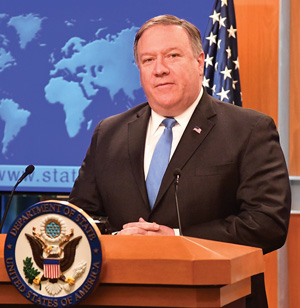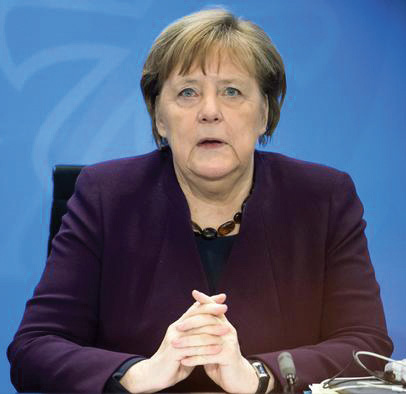Since Trump’s election the Atlantic trench has gotten wider as the differences between Brussels and Washington have grown more contentious. And trade is at the heart of the matter. With relations nearing a breaking point, can a U.S.-Europe trade war be averted…or is it already too late?
While the ongoing trade (and just about everything else) dispute with China is the daily headline grabber, the relations between the United States and Europe have steadily deteriorated since the election of President Trump in 2016. The reasons for the worsening relations between the Trump Administration and Europe are many. At its heart trade is the key matter, issues like the EU subsidies to Airbus (and Boeing’s support from the U.S. government) or the Administration’s 232 investigations into various import commodities. The Administration’s policy of disengagement, whether that be leaving international organizations like the Paris Climate Agreement, WHO or the threat to the Universal Postal Union, or more recently the WTO (World Trade Organization) not to mention NATO, all have played into Europe’s growing mistrust of the U.S. And Europe’s own ongoing struggle with BREXIT, strained relations with Russia and the trade imbroglio with China have added layers to this already complex state-of-affairs. Still for three-quarters of a century, Europe and the U.S. have largely been in close accord, can it be so again?
In October of 2019, the United States won their WTO case against Airbus subsidies and was awarded the right to impose tariffs on $7.5 billion of EU goods in a related case over subsidies for European plane maker Airbus. With the WTO ruling, the U.S. initiated tariffs of 15%-25% on $7.5 billion worth of European goods. The U.S. tariffs hit items such as planes, olives, tools and whisky, cheese, wine and pork primarily attacking imports from the Airbus manufacturing countries of Britain, France, Germany and Spain.
The EU itself has a complaint lodged against Boeing for U.S. subsidies to the Seattle-plane maker which is still being reviewed by the WTO. And without a WTO decision in hand, Brussels has been hamstrung in any potential moves against the U.S.
In June, the Trump Administration announced it was considering new levies on EU trade worth $3.1 billion annually - a move targeting products such as bakery goods, beer, gin and vodka. The EU felt the move was pouring salt into the wound and felt compelled to react.
In early July, EU Trade Commissioner Phil Hogan in reaction to the perceived rebuff of negotiations with the Trump Administration said in his report to the European Parliament’s trade committee, “I want to reassure people that we are ready to act decisively and strongly on European Union side if we don’t get the type of outcome we expect from the United States…”

Of course very few things emanating from Washington have met the “type of outcome” the EU either expected or desired. The EU’s laundry list of issues with the U.S. is long – the authorization of sanctions against any International Criminal Court official who investigates U.S. troops, digital taxation, sanctions against European companies working with Iran and Cuba, Noord Stream 2 proposed legislation [at this writing Pompeo announced the ending of the “sanction exemption” clearing the way for sanctions against EU companies], criticism of NATO and European defense contributions, the moving of 9,000 U.S. troops out of Germany, the moving of the U.S. embassy in Israel to Jerusalem and the “weaponizing” of 232 tariffs…and that’s just for starters. After all that, there is the Trump administration support for a “hard” Brexit, anti-EU intra-political groups and the U.S. handling of the COVID-19 pandemic resulting in the U.S. being left off of the July 1st EU “travel list”.
Friends and Frenemies
There is an old saying “my enemy’s enemy is my friend” and the Trump Administration has cast China as a global star in that role. At the virtual Copenhagen Democracy Summit on June 19th, Secretary of State Michael Pompeo addressing Europe and the China Challenge said, “Over decades, Americans and European companies invested in China with enormous optimism... Now we’re deeply intertwined. But even so – even so, we must acknowledge a set of facts about who and what we’re dealing with…The Chinese Communist Party decreed an end to freedom in Hong Kong, violating a UN-registered treaty and the rights of its citizens – one of just many international treaties that the Chinese Communist Party has violated.”

Recently, President Trump signed an executive order that would end preferential treatment for Hong Kong. At the news conference, Trump said, “No special privileges, no special economic treatment and no export of sensitive technologies,” for the Special Administrative Region. The President also signed the “Hong Kong Autonomy Act,” into law, enabling U.S. authorities to hold the individuals and institutions involved in the Hong Kong crackdown responsible. Recently, the Administration is reportedly looking to include members of China’s Communist Party in a travel ban related to Hong Kong.
While many European nations share the Administration’s view that China has acted as a “bad player”, they are understandably now far more reticent about throwing their lot in with the U.S.
And that’s the rub: At this moment what’s the real choice between the U.S. and China for Europe?
In Germany, Chancellor Angela Merkel has long cultivated political and economic ties with Beijing – and not coincidentally, China is now Germany’s biggest trade partner, overtaking the U.S. for that spot in 2017.
But the crackdown in Hong Kong ignited a backlash in Germany that put Merkel and her Christian Democratic Union party on the defensive over their coziness with Beijing.

And Merkel’s not alone in her plight. To various degrees, all 27 members of the EU were driving on China’s new Silk Road to the promise of prosperity…or at least they were until the pothole of the pandemic and crackdown in Hong Kong put a detour sign up.
But simply rethinking the relationship with China isn’t necessarily going to repair the EU’s friendship with Washington.
What Will be the New Normal in 2021?
With the U.S. Presidential elections coming up in November, the downward trajectory of the relationship between Europe and the U.S. could significantly improve. Former Vice President Joe Biden clearly favors a stable integrated EU, Paris Climate Agreement and the NATO pact’s role in Europe and beyond. A Biden Administration would also support the fundamental political and economic global institutions like the WTO and WHO. The many common denominators would certainly provide a starting point for establishing a basis for trade negotiations that thus far have eluded the Trump Administration.
But even should President Trump lose the election, there are many issues between Europe and the U.S. that will be difficult to hammer out in the environment of a highly nationalized and still Covid-19 plagued global economy.
Already we are seeing issues over how the digital economy will work. Last week, The European Commission lost a landmark case with Apple. The General Court of the European Union concurred with Apple (on a deal with two Apple Irish subsidiaries) that the generous tax deal that it agreed to with Ireland should stand rather than an EU assertion that the tax deal was a government subsidy. In effect allowing Ireland to remain a tech industry tax haven for Apple and others. In another ruling, the data sharing agreement between U.S. and EU called U.S.-EU Privacy Shield was struck down by the European Court of Justice. The deal was successfully challenged on the basis that U.S. national security laws did not protect EU citizens from government intrusion. In time, reshaping the digital relations between the EU and the U.S. may be much bigger than the dispute between the dueling aircraft makers.
And with Brexit will come a new yet to be determined trade agreement with the U.S. and the United Kingdom. Potentially, this trade agreement could open the doors for even closer trade between the already closest U.S. partner in Europe. But that agreement doesn’t exist in a void – far more problematical is the future post-Brexit trade agreement between the U.K and EU, which is due to be finalized this year but still has many stumbling blocks. The idea of an “orderly” split is favored by most parties [the Trump Administration being the outlier]. For example, Merkel in a widely publicized recent interview said, “It would, of course be in Britain’s and all the EU member states’ interest to achieve an orderly departure…but that can only happen if it is what both sides want.”
Merkel’s point being that the ball is really in Britain’s court – what does the UK want from the deal?
And it is perhaps the same with the U.S. relationship with Europe. What does the U.S. want from the deal, a question that is likely to remain unanswered until after the November election.
_-_127500_-_1da204f56eddee4a9ff1d6f8fe7f7f4e89a54723_lqip.jpg)




